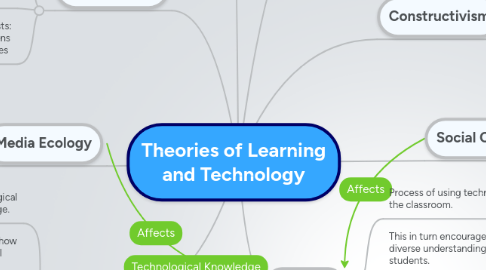Theories of Learning and Technology
by Laura Rohac


1. Connectivism
1.1. Based on using a network to collect information and facilitate learning.
1.2. Techniques within this learning style: -Social networking sites like Facebook, Twitter, and YouTube
1.3. Theorists: -Siemens -Downes
2. Cognitivism
2.1. Cognitive Load Theory: Too much outside influence or too little interest can affect someone's ability to learn
2.2. Based on thinking of the brain as a computer. Uses a system of schema for memory.
2.2.1. (Schema can be thought of as a filing system.)
2.3. Techniques within this learning style: -Prezi -Mnemonic devices
2.4. Theorists: -Piaget -Chomsky
3. Media Ecology
3.1. A study of how media as an environment affects people, and they behavior and understanding of the world.
3.2. Theorists: -McLuhan -Fiore
4. TPACK
4.1. Technological, Pedagogical and Content Knowledge.
4.2. TK: Understanding of technology and how we can make it work in the educational world.
4.2.1. Technology in the classroom, computer capabilities and internet usage.
4.3. PK: Understanding of which methods are most effective in teaching students.
4.3.1. Studies of education and students, and the most useful techniques discovered.
4.4. CK: Understanding of the subject being taught.
4.4.1. Curriculum, related information.
